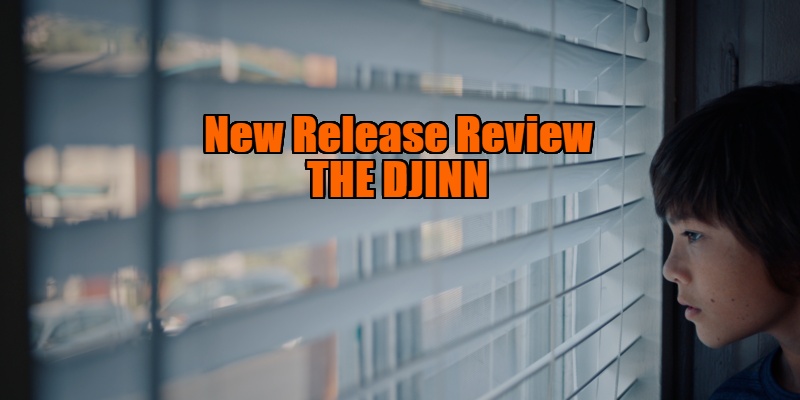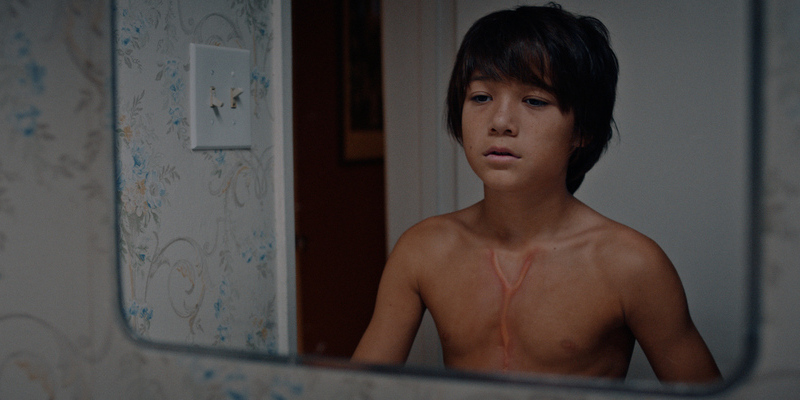
Review by
Eric Hillis
Directed by: David Charbonier, Justin Powell
Starring: Ezra Dewey, Rob Brownstein, Tevy Poe, John Erickson, Donald Pitts

Horror movies have seen all manner of demons summoned by unwitting
fools. Usually it requires some sort of incantation spoken in an ancient
language like Latin, Hebrew or Sumerian, or maybe you just have to say
the name of an urban legend three times in front of a mirror.
Writer/directors David Charbonier and Justin Powell's
The Djinn features an incantation spoken in front of a
mirror, but the twist here is that it's uttered not in some old lingo,
but in American Sign Language. The effect is just the same. That is to
say, not the outcome our protagonist hoped for.

Following his mother's suicide, which we glimpse in a flashback, mute
12-year-old Dylan (Ezra Dewey) and his father Michael (Rob Brownstein) move into a new bungalow home. As Michael is a graveyard shift DJ,
Dylan is left alone on the first night in their new home. Bored, he
starts rummaging through some bric-a-brac left by the house's previous
tenant, an elderly man who apparently took his own life. Among the
leftover possessions Dylan finds a book of spells called the "Book of
Shadows." One spell purports to grant its summoner one wish, and
figuring he has nothing to lose, Dylan performs the rite, wishing for "a
voice".
It seems to have had no effect, and Dylan retires to bed disconsolate.
But when he investigates some noises, he discovers he's not alone in the
home. Dylan should have read the small print on the spell, as in order
for his wish to be granted he must survive an hour with a Djinn, who can
only be destroyed by blowing out a candle when the clock strikes
midnight.

Djinns, which have their origins in Arabic folklore, have been co-opted
by many a Western filmmaker at this point, but Charbonier and Powell
might be the first to make something worthwhile of the idea. Rather than
getting bogged down in setting up the concept of a Djinn, they pare down
the folklore to its bare essentials. After a brief narration from the
book of spells lets us know what Dylan is up against, the movie becomes
an exercise in sustained dialogue free visual storytelling, playing out
in something close to real time as Dylan keeps an eye on the clock,
counting down the minutes to midnight.
Dylan's attempts to escape the bungalow prove futile as it seems the
Djinn has created some sort of force field to keep him trapped. This
means the action plays out in a very confined space, and the movie
benefits greatly from how well Charbonier and Powell lay out the
geography of their limited setting. We always know where Dylan is in
relation to his supernatural foe, which adds much suspense. When the
Djinn - which alternates between the forms of previous human victims,
including Dylan's Mom - is blinded, the movie becomes a terrifying
ballet as Dylan treads softly around his opponent in a tense dance.
There are some real heart in mouth moments as Dylan glides past the
Djinn mere centimetres away.

Complimenting the directorial skills of Charbonier and Powell is the
young Dewey, whose silent performance is immensely impressive. Any
potential for poor taste in having a mute young boy menaced in a horror
movie is soon dispensed as it becomes clear just how smart and
resourceful Dylan is. Like Home Alone and its French
forerunner 3615 Code Père Noël, The Djinn sees its home invader up against a formidable
young foe. But make no mistake, this is no comedy, and despite its
precocious protagonist it's no kids movie either.
The Djinn plays its horrors with a straight face, and with
the subplot of Dylan's mother's death it has a heavy dose of
heartbreaking pathos. In this age of helicopter parenting and
molly-coddled kids, it's refreshing to see a movie that dares to inflict
horrors - of both our own world and other dimensions - on a child
without coming across as mean-spirited. I would have loved this had I
seen it as a kid, though I may have slept with the lights on that
night.


